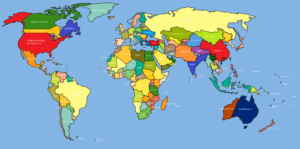According to a 2015 Pew Research Center study, 59 percent of respondents agreed that “there is so much wrong with the federal tax system that Congress should completely change it.” But change it to what? Before conversations about tax reform begin in earnest, perhaps it’s a good time to see how other countries handle their taxation systems.
Making apples to apples comparisons between countries is surprisingly challenging. For instance, the tax consequences of unemployment compensation in the United States differ starkly from those in countries like Japan and South Korea. Also, there’s no equal to the size, scale and diversity of the U.S. economy.
However, smart people have developed some ingenious metrics to compare tax codes approximately. The Organization for Economic Cooperation and Development (OECD), for instance, maintains a database of wages, taxes and benefits, standardizing data beginning in 2001 from 39 countries for a number of family types. According to a report issued by the Tax Foundation, the U.S. is ranked number 31 out of 35 developed countries in the OECD in terms of its tax code. The only countries that ranked lower than the U.S. were Greece, Portugal, Italy and France.
The organization stated, “The United States scores poorly largely because it maintains the highest corporate tax rate in the developed world at 39.1 percent and is one of the six remaining countries in the OECD with a worldwide system of taxation. Its poorly structured property, individual and capital gains and dividends taxes also contribute to the low ranking.”
Estonia ranked first on the list, followed by New Zealand and Switzerland. According to the Tax Foundation, Estonia has “the most competitive tax system in the developed world” with a fairly low 21 percent taxation rate for both individuals and corporations. Key factors driving the high rank also include a territorial tax system that offers 100 percent exemption of foreign profits. And it only taxes the land’s value, and not the value of the structures and buildings.
In New Zealand, the Inland Revenue Department collects the taxes on behalf of the Government of New Zealand. National taxes are calculated based on business and personal income as well as the supply of services and goods. A range of government agencies—such as the New Zealand Customs Service—is responsible for collecting an excise or duty tax on some goods and services, including gaming and alcohol. Local authorities manage and collect local property taxes, and there is no land tax or social security tax in the country.
According to the Tax Policy Center, the United States is unique in the OECD survey in that it only collects 17 percent of federal tax revenue from sales and consumption taxes. On average, OECD countries collect 33 percent of their revenue from similar taxes, most by way of a value-added tax (VAT).
By contrast, U.S. property taxes are significantly higher (11 percent as of 2014) than property taxes for the average OECD country (6 percent).
In terms of how different countries pay for their entitlement programs, the United States is in the middle of the OECD pack. Approximately one out of ever four U.S. tax dollars collected goes to Social Security or similar programs. That’s just about average for the OECD group. On the higher end, countries like the Czech Republic, Japan and the Netherlands get 40 percent of their tax dollars from contributions to safety net programs.
It’s tempting to look at other countries’ taxation systems to point out “what’s wrong” with the IRS and with the United States’ approach to taxation in general—or to use these data points to celebrate some aspect of our system. But our country is an outlier in so many ways, even if policy analysts can find creative prompts by studying other countries tax ideas.
Of course, if you’re dealing with an urgent IRS tax issue, such as a delinquent tax debt, you’re probably less concerned with the fine points of policy and more stressed about what could happen to you, your family and your business—and what you should do about it. Call our team today for insight, and get the clarity you need to stop worrying.

